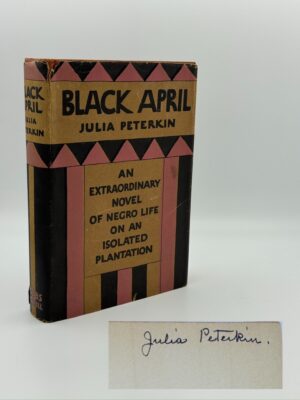Black Studies
Showing all 2 results
-
Michael X born Michael de Freitas, aka Michael Abdul Malik and Abdul Malik (1933-1975)
HOLOGRAPHIC LETTER FROM A BLACK POWER ACTIVIST
$850.00Single sheet with a handwritten note by this Trinidian-born Black activist, written on one side only, addressed to “Sister” and signed with his usual “Peace and Love.” Undated but the address at the top is 101 Holloway Road, the site of the “Black House,” a commune of which he was the self-appointed leader which was founded in 1969. That was also the year that the Cleavers arrived in Algeria. Michael X described the Black House as a place where “that ‘get a gun’ rhetoric is over. We’re talking of really building things in the community needed by people in the community. We’re keeping a sane approach” although it was later the site of an attempted extortion, for which Michael and four of his colleagues were arrested – and bailed out by John Lennon. This note, which comments that the bearer works for an Australian underground magazine called Oz, co-founded and edited by Richard Neville, reveals how related the various movements of the late 60s were – from the Black Panthers in exile, to Richard Neville’s controversial publishing venture, to John and Yoko Lennon contributing to a fund-raiser for the Black House. Seen in the light of his last years when Michael X returned to Trinidad, where he was tried and convicted and sentenced to death for his involvement in the murders of two members of the commune he founded there (a story told by Nobel Laureate V.S. Naipaul in ‘Killings in Trinidad”), closing with ‘Peace and Love’ seems ironic. Sheet measures approximately 12 1/2 in by 8 inches. less
moreOffered for Sale by: Bookfever.com -
Peterkin, Julia
Black April
$800.00Bobbs Merrill: Indianapolis, 1927. First edition, first issue with ‘ducks quacked’ on page 17 (Ahearn Collected Books). “An extraordinary novel of Negro life on an isolated plantation” signed by the author on front free endpaper. Black April was “accepted by the critics as being one of the best books ever written about the southern negro” (The Sunday Oregonian). A very good copy, gilt on spine and front cover dulled as usual in very good, first issue dust wrapper without Crawford blurb, price intact, extremities of spine a little chipped, one small edge tear to rear. Peterkin went on to win the Pulitzer Prize in 1929, the first southern novelist to receive that honor. A household name for the better part of three decades, “Peterkin’s accomplishment lay in her upending the traditional plantation novel by replacing its gross stereotypes with rural black southerners of complexity, stamina, integrity, and courage, while valorizing the African spiritual inheritance as a transcendent force of cultural regeneration. Because no Uncle Toms, Aunt Jemimas or Colonels clad in white linen inhabited Peterkin’s fiction (indeed, white characters made rare appearances), and because she dared depict tender love and sex between black people, prickly white southerners viewed her suspiciously, perceiving her work as inflammatory and pornographic. In a letter to her mentor H.L. Mencken, Peterkin admitted the sting of her own family’s disdain. Her grown son, she relayed, urged her to write about ‘beautiful white men and women, not n-words.’ In a poignant confession of her alienation she tersely wrote, ‘No beautiful white people live in my head.'” (Life out of Darkness: The Recovery of Julia Peterkin, Forgotten Pulitzer Prize Winner by Elizabeth Robeson, M.Phil, Columbia University). less
moreOffered for Sale by: The Accidental Bookseller

 USD
USD GBP
GBP EUR
EUR CAD
CAD AUD
AUD ZAR
ZAR
